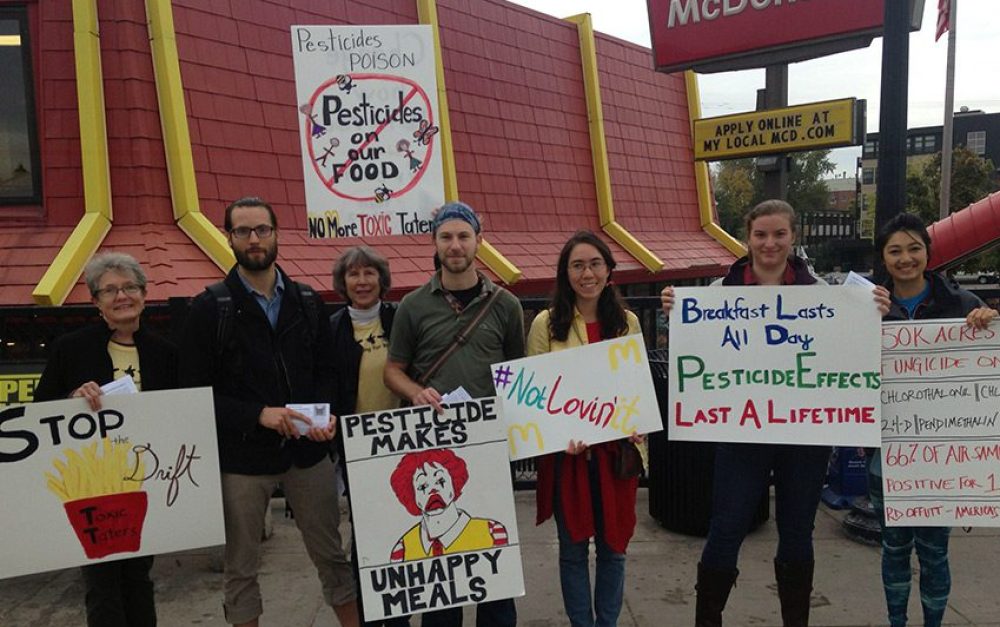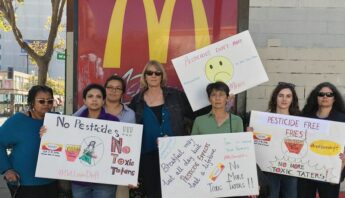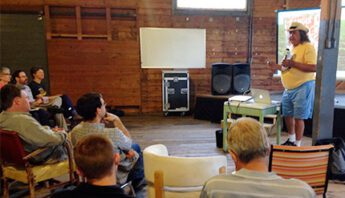Families across the country are worried about McDonald’s, for more reasons than one. Because McDonald’s is such a huge player in our food system, the decisions the company makes — from marketing, to sourcing, to wages — have a ripple effect. This year, families who are affected by McDonald’s practices are speaking up together as part of a Toxic Taters week of action. The core message? Families deserve better.
At the center of next week’s actions are calls for McDonald’s to reduce pesticide use in fields where potatoes are grown for the company’s “world famous fries” — part of a broader challenge to the corporation to clean up its act.
Kids are on the frontline
Earlier this week, I joined PAN staff scientist Emily Marquez at two community events in Minnesota, where she presented the findings of our Kids on the Frontline report. The first event was at the Pine Point School, where years ago our community partners at the White Earth Land Recovery Project tested the air for potato pesticides from RD Offutt’s potato fields.
After pesticides were found drifting from neighboring fields, RDO stopped growing potatoes directly across the street from the school. But people in Pine Point still worry about pesticides in their air and water.
As Emily showed slides of pesticide use across the country, people leaned in closer, squinting at the map to find the counties where they farm, where their families live, where they’re raising their kids and grandkids — highlighted in the deep red color that indicated higher rates of pesticide use. People shared stories and concerns. “The agricultural chemicals in my water are above the health standard. What should I do?” “What happens when we hunt deer or goose that have been living around RDO’s fields? People know to stay away from the skull-and-crossbones signs. But the animals don’t.”
Childhood cancer rates and developmental disabilities are on the rise. Pesticides aren’t the only factor, of course, but they’re an important one. And for corporations that pride themselves on being responsible corporate citizens — like McDonald’s and RDO — pesticides are a factor they can do something about.
McTeachers? Really?
In the meantime, further down the food chain: keeping McDonald’s brand above water is full-time work. More families are asking tough questions about wages, nutrition and marketing to kids. One of McDonald’s strategies for building brand buy-in is McTeacher’s Nights, where underfunded schools enlist their teachers to work the counter at a local McDonald’s for a night, with proceeds benefitting the school.
Of course, McTeacher’s Nights don’t begin to address the root causes of the problems facing local communities: under-resourced schools and lack of healthy, affordable food that keeps jobs and money in the community, instead of lining corporate pockets. But McTeacher’s Nights do help McDonald’s reach young kids with their marketing.
And which schools are most likely to rely on McTeacher’s Nights to help balance their budgets? More often than not, it’s underfunded schools in communities of color.
Behind those same counters, fast food workers are pressing for a living wage and the right to organize in the workplace. Workers at McDonald’s and other fast food chains have built a fierce Fight for $15 movement that has changed the national conversation about low-wage work, and won policy changes in a handful of cities and states.
From farm to family
At PAN, we work towards a food system where problems aren’t solved by sending them to someone else’s backyard. Toxic chemicals applied to a field don’t just go “away” — they may make their way into a community’s groundwater, or drift into a nearby school, or land on the crops of a neighboring farmer.
Pesticides contaminating the air and water of a community is a symptom of a food system gone awry. Other symptoms? Communities don’t get to make real decisions about the food they eat, and low-wage jobs serve the interest of high-profit corporations.
We’re simply not going to let McDonald’s and its potato supplier RDO greenwash their way out of these problems.
Join us, you can help!
Our National Week of Action targeting McDonald’s starts next Sunday, and we’re calling on the company to work with RDO — one of its major potato suppliers — to make the following commitments:
- Meaningfully cut their use of health-harming pesticides.
- Release information on the chemicals they apply to their crops.
- Fund a human and ecological health study on the regions impacted by potato production.
- Adopt environmentally sound, sustainable agriculture practices.
Want to get involved? Here’s how:
- On Monday, join a webinar about the farm-to-family impacts of the McDonald’s Corporation. Hear firsthand from people who deal with pesticides drifting from RDO potato fields, and moms who are concerned about McDonald’s targeting their kids.
- All week long, speak up on social media, sharing this video and calling on McDonald’s to cut potato pesticides.
- Hand-deliver a letter to a McDonald’s store. It’s quick and easy — and it shows nationwide support for communities near McDonald’s potato fields.
And if you’re planning on doing any of these things, please take the pledge so we can connect you with the latest resources from Toxic Taters.
It’s our food system. From farm to family, communities are fighting to take it back. Let’s stand with them.








